

Lyn Drohomyretskyy
Early Years Teacher Aspiring Teacher Librarian Curator of online content relevant to our curriculum and our school.
Tour. LibraryThing is a cataloging and social networking site for book lovers.
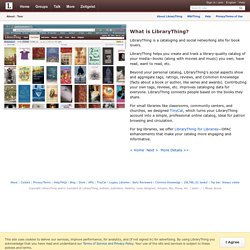
LibraryThing helps you create and track a library-quality catalog of your media—books (along with movies and music) you own, have read, want to read, etc. Beyond your personal catalog, LibraryThing's social aspects show and aggregate tags, ratings, reviews, and Common Knowledge (facts about a book or author, like series and awards). Contributing your own tags, reviews, etc. improves cataloging data for everyone. LibraryThing connects people based on the books they share. For small libraries like classrooms, community centers, and churches, we designed TinyCat, which turns your LibraryThing account into a simple, professional online catalog, ideal for patron browsing and circulation.
No Shelf Required – Digital content, in libraries and beyond, and the ways it transforms the world. Connections. TeleRead: Ebooks, publishing, libraries, tech, and related topics. English for the Australian Curriculum. SCIS. Library of Congress Authorities (Search for Name, Subject, Title and Name/Title) What is the Schools Online Thesaurus? There is a rapidly expanding amount of online teaching materials available to schools.
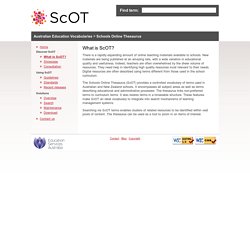
New materials are being published at an amazing rate, with a wide variation in educational quality and usefulness. Indeed, teachers are often overwhelmed by the sheer volume of resources. They need help in identifying high quality resources most relevant to their needs. Digital resources are often described using terms different from those used in the school curriculum. The Schools Online Thesaurus (ScOT) provides a controlled vocabulary of terms used in Australian and New Zealand schools. Searching via ScOT terms enables clusters of related resources to be identified within vast pools of content. RDA Toolkit. SurveyMonkey: The World’s Most Popular Free Online Survey Tool.
Data Collection Tools for Challenging Environments. Session 5 : Uncle Ernie's Holistic Framework WEBINAR - Sally Lawrence. Helping you learn and teach about Aboriginal culture. The Official Roald Dahl Website - Educators. How to Mind Map in Seven Steps. Menu How to Mind Map in Seven Steps...
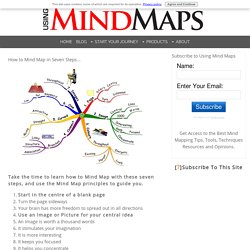
Take the time to learn how to Mind Map with these seven steps, and use the Mind Map principles to guide you. Subscribe to Using Mind Maps We respect your email privacy Get Access to the Best Mind Mapping Tips, Tools, Techniques Resources and Opinions. Try to memorise these seven steps. You are now armed with all the knowledge to do your first Mind Map using both words and images. Learning how to Mind Map with our short, easy articles and Mind Map examples will make you a Mind Map expert in no time. Free Graphic Organizers for Teachers. 8 Ways. 4. Image Creation - Creating Multimodal Text. Consider using a stylus when drawing, annotating or marking up images.
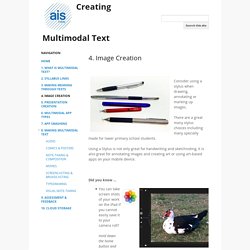
There are a great many stylus choices including many specially made for lower primary school students. Scribblitt - Make Your Own Book - Kids Self Publishing. Online Whiteboard for Visual Collaboration. Home page - Edtalks. Manufacture Cardboard – Google VR. Launching Young Readers. Literacy Archives. Melbourne Videos - New Learning Online. Videos. Australian Children's Literature. Where The Wild Things Are. Children's Books Online - Children's Books Daily... Kids' Book Review. Childrens Books. Riverbend Standing Orders. Useful websites for School Library Collection Development.
Magabala Books. Black Ink Press. Logan District Aboriginal & Torres Strait Islander Corporation for Elders - Accueil. Nyeumba Meta Space - Logan City Council Libraries. About Nyeumba Meta Welcome to Nyeumba-Meta.
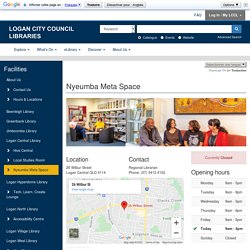
Reading opens doors charity non profit. Welcome to the Aboriginal and or Torres Strait Islander Resource - NCACL. Please note: Aboriginal and Torres Strait Islander people should be aware that this resource may contain images, voices or names of deceased persons in photographs, film, audio recordings or printed material.
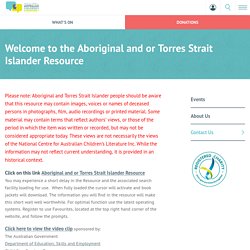
Some material may contain terms that reflect authors’ views, or those of the period in which the item was written or recorded, but may not be considered appropriate today. These views are not necessarily the views of the National Centre for Australian Children’s Literature Inc. While the information may not reflect current understanding, it is provided in an historical context. Welcome to the Aboriginal and or Torres Strait Islander Resource You may experience a short delay in the Resource and the associated search facility loading for use.
InLanguage. Indigenous Kids Read. Aboriginal and Torres Strait Islander histories and cultures. Indigenous Australians. Australian Institute of Aboriginal and Torres Strait Islander Studies. Ngutana-Lui Centre. COVID19 Information At Ngutana-Lui, we understand that there is community concern around COVID-19 and public spaces and events.
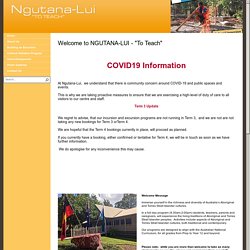
This is why we are taking proactive measures to ensure that we are exercising a high-level of duty of care to all visitors to our centre and staff. We regret to advise, that our incursion and excursion programs are not running in Term 3, and we are not are not taking any new bookings for Term 3 orTerm 4. We are hopeful that the Term 4 bookings currently in place, will procced as planned. If you currently have a booking, either confirmed or tentative for Term 4, we will be in touch as soon as we have further information.
We do apologise for any inconvenience this may cause. Welcome Message. Inala Wangarra. ABC Radio National - Hindsight - Holding our tongues. Holding our tongues is a Hindsight project about the long and painful task of reviving Aboriginal languages.
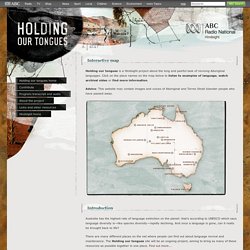
Click on the place names on the map below to listen to examples of language, watch archival video or find more information. Advice: This website may contain images and voices of Aboriginal and Torres Strait Islander people who have passed away. Introduction Australia has the highest rate of language extinction on the planet: that's according to UNESCO which says language diversity is—like species diversity—rapidly declining.